“Seeing your own home in a fresh way can be difficult, and Matthew Hollett does it with grace, humour and intelligence” – review by Monica Kidd
March 2023
Optic Nerve
by Matthew Hollett
Brick Books, 2023
$22.95 80 pages
Full disclosure. I first became aware of this collection of poetry a few years back, shortly after St John’s artist Matthew Hollett published his first book, Album Rock (Boulder Books, 2018), a work of non-fiction and poetry investigating a photo taken in the 1850s by Paul-Émile Miot, one of the first photographers to visit Newfoundland. Optic Nerve had emerged a few years prior from a mentorship with St John’s poet Mark Callanan and I was impressed by Hollett’s ability, even then as a so-called emerging poet, to capture life in St John’s without cliché and nostalgia.
Little wonder, I suppose, given his Master of Fine Arts from the Nova Scotia College of Art and Design and the camera seemingly grafted to his body: his gaze is professional. But training or no, seeing your own home in a fresh way can be difficult, and he does it with grace, humour and intelligence.
The book is divided into three sections, In Camera, In Negative, In Print. The first section, if not about photography per se, seems to be about the work of seeing.
“Cloudlarking,” for example, describes the particular way the fog climbs Hollett’s beloved Signal Hill. His images draw on the protean and otherwise unknowable things: “an embryo // pluming upwards from an umbilical tail, a tadpole.” We watch him as he tries on a selection of other slippery metaphors to understand the weather, settling finally on a leviathan with “a billion spindly tentacles” and remarking to another photographer, “It’s something to work with.”
It makes sense that a photographer such as Hollett would excel at ekphrastic poetry. “After André Kertész’s Paris, A Bird Market near the Hôtel de Ville, 1926” responds to an image made by the American photographer of two men examining a tiny bird in an ancient bird market along the banks of the Seine. The narrator, perhaps aware he’s been taken by a hawker, has nonetheless purchased the bird, impelled by “the canary’s // heartbeat thrumming the walls” and the wild and terrified energy contained in the cage, though this he holds at “a certain distance” from his chest, “as if it’s wired to explode.” (Two other works by Kertész appear in the collection — Hollett must be an admirer.) In “After David Milne’s Bomb Crater behind Vimy Station, 6 June 1919,” Hollett chases the distraught energy of an artist trying to capture what remains after war: “that tarnished // looking-glass with its thousand-yard stare, // that tormented blister rimmed with dried blood // and oozing pus.” As a fellow artist, Hollett points us to the hesitation and exhaustion evident in Milne’s lines.
Though the collection is mostly prose poems, with appearances by several solid list poems, it also showcases poems that simply luxuriate in music, as in “Merchant Vessels,” which won The Malahat Review’s 2021 Open Season Award:
merchant vessel, a mellifluous vintage
of a phrase, with hints of mussel, kestrel, sessile, fossil,
of fissile, a piece of wood split along the grain,
of ventricle, vascular, steam pluming
from smokestacks as thick as butchers’ wrists, of vestige,
every knot in a plank gripping a memory of how it felt
when wind rushed through a forest.
And Hollett loves his language play. In “Some Kind of Understanding (1),” the call of a crow is a “frogglehorn // with a flu in its throat” and the song of a blackbird is that of it rewiring its “syrinxthesizer.” In Hollett’s poem, “Frost,” the crystalline light of a frost-glazed morning rattles around in the mouth with “A conspiracy of lickspittles, // frost sabre-rattles, embrittles, glitterbombs, // blights.” Then there are all of those jaw-unhinging ahs in “A Beetle Found Drowning,” with its “My shadow was a polliwog // oscillating between grasshopper and octopus.” It a collection that wants to heard as much as read.
The collection’s middle section, In Negative, invites us into the negative space inhabited by grief and by memories of missing people, where, as in “Coriolis Borealis,” “nights are formless // and haunted by wrong turns.” This section includes “Tickling the Scar” which won the 2020 CBC Poetry Prize. I remember when this happened, and Hollett’s depiction of discarded bicycles encrusted with zebra mussels that, when split open, put him in mind of “tiny, dessicated lungs.” In the early days of the pandemic, the image felt so apt, presented inside the poem’s many layers of sorrow: for “ninety-year-olds so dehydrated // they’re unable to speak,” not to mention a lake “torn // into an industrial corridor,” and for songbirds building nests with discarded masks. Though I don’t think this poem — a well-crafted dirge — is the collection’s strongest, it helps to establish the negative space that provides depth and form to the bursts of joy which appear elsewhere.
In case you were wondering, my favourite poem — though again perhaps not the volume’s strongest (I would rank “With Tongue” and “Bus” in the top two, for their sheer ability to say so much with so little, and with such specificity) — is “Wind in St John’s,” a short film featuring the wind as antihero fishtailing down Duckworth, pissing its initials in the snow outside the courthouse, snapping bras from clotheslines, resenting its reputation, and “bluffing eighty // when it’s barely fifty.”
And there is Hollett, grinning and not looking away.
Monica Kidd is a writer of poetry, fiction and non-fiction. Her most recent book is the poetry collection Chance Encounters with Wild Animals (Gaspereau Press, 2019). For more of her work visit monicakidd.ca



